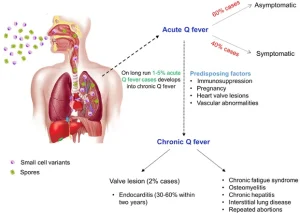Overview
Diagnosis
Diagnosing Q fever can be challenging because its symptoms often resemble those of other illnesses. A healthcare professional will begin with a detailed medical history, focusing on possible exposure to animals such as cattle, sheep, or goats. A physical examination is followed by specific laboratory tests to confirm the diagnosis.
Tests that may be recommended include:
-
Blood tests to detect antibodies against the bacteria Coxiella burnetii, which causes Q fever. These antibodies may not appear until several days after symptoms begin, so repeat testing may be necessary.
-
Polymerase chain reaction (PCR) testing to identify the genetic material of the bacteria in the blood. This test is especially useful early in the illness.
-
Imaging tests such as echocardiography if chronic Q fever is suspected, particularly to check for inflammation of the heart valves or lining.
Because early symptoms mimic those of the flu, accurate diagnosis often depends on a combination of exposure history and laboratory confirmation.
Treatment
Treatment for Q fever aims to eliminate the bacterial infection and prevent complications. The type and duration of treatment depend on whether the infection is acute or chronic.
For acute Q fever, the primary treatment is an antibiotic regimen.
-
Doxycycline is the most commonly prescribed antibiotic, typically taken for 14 days.
-
It is most effective when started soon after symptoms appear.
-
People allergic to doxycycline or pregnant women may receive alternative antibiotics as recommended by their healthcare provider.
For chronic Q fever, which can occur months or years after the initial infection, treatment is more intensive.
-
A combination of doxycycline and hydroxychloroquine may be prescribed for 18 to 24 months or longer.
-
Regular blood tests help monitor progress and ensure that the infection is fully cleared.
Supportive care may also be recommended to relieve symptoms such as fever, fatigue, or muscle pain.
People with underlying heart or liver conditions should receive close follow-up care, as Q fever can sometimes cause long-term complications like endocarditis or chronic liver inflammation. Early diagnosis and prompt antibiotic therapy offer the best chance for full recovery.
Advertisement

